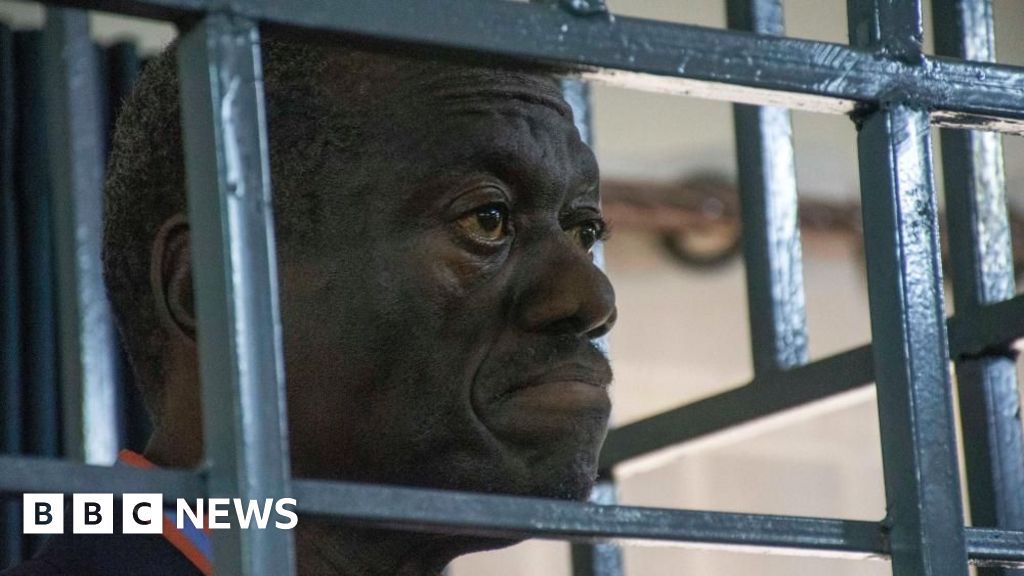The wife of detained Ugandan opposition politician Kizza Besigye has denounced as “cruel and inhumane” a ban on prisoners receiving visitors on Christmas Day.
Besigye, 68, has been charged in a military court with possession of pistols and attempting to purchase weapons abroad, which he denies. His trial has been delayed until next month.
Prison authorities say that as part of measures to prevent “potential security lapses”, inmates would not be allowed visitors for seven days, starting on Christmas Eve.
Besigye’s wife Winnie Byanyima, the head of the UN’s organisation to tackle HIV and Aids, said she planned to camp outside the Luzira Prison so that she could see her husband and give him food on Christmas Day.
She told the BBC her husband remains “strong and persevering” in a “tiny little room” behind six prison gates, but she was worried that he could be “harmed”.
“I’m not leaving Besigye’s food at the gate [as directed]. I will go there and see my husband because I don’t trust them with him even for a single day,” Ms Byanyima said.
“Maybe I will take a tent and sleep there… if that’s what they want,” she added.
Besigye has contested and lost four presidential elections against President Yoweri Museveni, who has been in power since 1986.
But the veteran opposition politician has been less active in politics in recent years, and did not contest the 2021 election.
Besigye, however, returned to the headlines last month after he was dramatically abducted while visiting Kenya and forcibly taken to Uganda.
He was then charged along with an aide, Obeid Lutale. He, too, has denied the charges.
The military court extended Besigye’s detention until 7 January, dashing the hopes of his family that he will be home for Christmas.
Uganda Prisons Services spokesperson Frank Baine Mayanja told local media that the seven-day ban on visitors was intended to tighten security during the festive season, and to prevent escapes.
“Christmas causes excitement and majority of prisoners do not want to have Christmas inside. They must be planning on how to do a prison break and go outside,” Mr Mayanja told NTV Uganda.
The Prison Services had initially announced a ban of almost a month on prison visits, but then reduced the ban to seven days.
Ms Byanyima told the BBC she was also concerned about the recent change of leadership at Luzira prison, questioning why a “young and inexperienced” official had been put in charge of it.
“It is very suspicious and makes me doubt their intentions,” she said.
“I do not trust his [Besigye’s] life with those who abducted him. I will seek to see him as often as I can,” Ms Byanyima added.
Mr Mayanja said the changes in leadership were an “administrative issue” and had nothing to do with Besigye.
He added that Ms Byanyima should trust the authorities to take care of her husband because “we have the means and mechanism of keeping him alive”.
“I think she should let us do our job,” Mr Mayanja said.
This is the second time Besigye, who has had run-ins with Museveni’s government for the last two decades, is spending the Christmas holidays in prison.
In 2005, he was arrested while returning from a political rally ahead of the 2006 presidential polls and charged with treason. The charges were thrown out by the courts.
He was also charged with rape in a separate case. The charges were later dropped. He said all the allegations were part of a campaign of political persecution
In the latest case, Besigye has objected to being tried by a military court, saying he should be tried in a civilian court if there was any case against him.
Museveni has defended the use of military courts to try civilians.
He said any crime involving a gun was dealt with in a military court to ensure the country’s stability as civilian courts took too long to deal with cases.
Hundreds of civilians have been tried in Uganda’s military courts, even though the Constitutional Court has ruled against the practice.
Opposition parties have frequently complained about restrictions on political activities, alleging that Museveni fears political competition.
Museveni’s supporters deny the allegation, and say he has maintained stability during his rule of almost 40 years.




